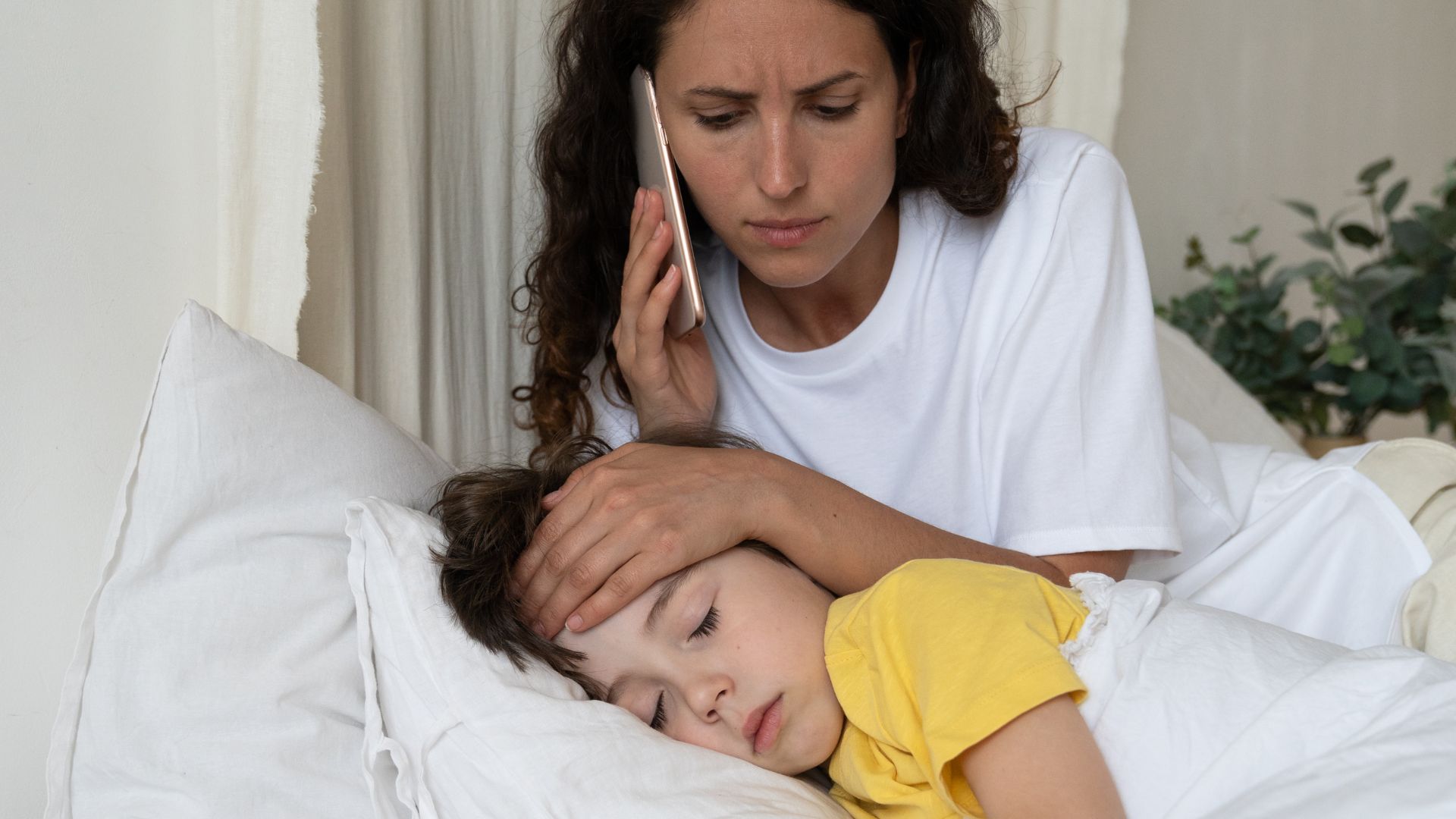
Flu in children is a common viral infection that affects the airways in the lungs. It is characterized by symptoms like a cough, a fever, and body aches. It is one of winter’s most severe and pervasive viral illnesses. The flu typically only lasts a few days in children. However, some kids have more severe conditions that might necessitate hospitalization. The flu can also be fatal if it progresses to pneumonia (a lung infection).
The flu can spread quickly from one person to another. The virus that causes influenza spreads through people when an infected person coughs, sneezes, or speaks. Anyone can contract the flu virus by inhaling it or by touching their nose, eyes, or mouth after coming into contact with something that has the virus on it (like a toy, pens and pencils, doorknobs, and countertops). It can also spread when eating and drinking utensils are shared.
From the day they become ill until 5 to 7 days later, individuals with the flu may be able to spread the infection.
Causes of Flu
Flu viruses bring on the flu illness. There are three different influenza viruses:
Influenza Virus Types A and B: These two viruses frequently cause widespread illness during the winter (epidemics). They often lead to more patients being admitted to hospitals and more flu-related deaths. The spread of types A and B is the main focus of public health officials’ efforts. Viral changes (mutations) frequently occur, which is one of the reasons the flu is still a problem. This implies that new virus types are exposed to humans every year.
Influenza Subtype C: Only minimal respiratory symptoms are brought on by this virus and epidemics are not caused by it. (March of Dimes)
Flu in Children
Did you know that children can be more prone to getting the flu than adults? It’s essential to know the symptoms and how to treat them.
Common symptoms in children include fever, cough, sore throat, runny or stuffy nose, muscle or body aches, headaches, and fatigue. Treatment for children may include over-the-counter medications for fever, pain relief, and plenty of rest and fluids.
Clean your child’s dishes and utensils with hot, soapy water, wash your hands with soap and water before and after caring for your child and it’s best to avoid to contact with people during this time. It’s also recommended to keep your child home from school or daycare until they are feeling better to prevent spreading illness to others. If your child is at high risk for complications from the flu, talk with your healthcare provider about getting a yearly flu vaccine.
Treatment of Flu
According to the Centers for Disease Control and Prevention (CDC) and the American Academy of Pediatrics (AAP), everyone six months of age and older should get a flu shot yearly. Children under five should get it in particular because they are more likely than older children to suffer serious health consequences from the flu. Even healthy children are vulnerable to the flu.
Getting the flu shot every year before flu season (October through May) is the ideal way to avoid it. Even though flu season is the most likely time for your child to become ill, the illness can strike at any time. According to the CDC, vaccinations are more important than ever to protect you and those around you. We now must consider adding COVID-19 to our annual vaccine preventatives. Both the COVID-19 and flu vaccines can be administered simultaneously.
Flu Vaccines for Children
There are two ways for your child to receive the flu shot:
Flu Vaccine Injection: The influenza vaccine is suitable for children starting at six months of age. Your pediatrician will provide vaccine information to parents and caregivers so you can be informed of vaccine side-effects which are rare, but do happen.
Influenza Nasal Spray: Your child’s provider will spray this vaccine into the nasal cavity. Most kids aged two and up can safely use the flu nasal spray. It is not recommended for children with asthma, heart or lung problems, or a weakened immune system that does not adequately protect them from infection. Children who have been taking certain medications for a long time, such as aspirin, should avoid using the flu nasal spray.
(March of Dimes)
Antiviral Medications and Testing
If your child becomes ill with the flu this season, the doctor will advise on whether they should take antiviral medications such as Tamiflu, Relenza, or Rapivab, and what over-the-counter medicines will help with symptoms.
Flu viruses are numerous and are constantly changing. It’s crucial to vaccinate your child against the flu every year because it offers defense against the virus for about a year. Each year, a new flu shot is created to guard against three or four flu strains anticipated to be contagious during the coming flu season. Your PCP or pediatrician is your first line of defense when it comes to preventing flu, and to know what to do if your child has flu symptoms. A PCP flu test can be administered to know for certain and treat symptoms accordingly.
Work Cited
“The Flu (Influenza) (for Parents) – Nemours Kidshealth.” Edited by Jonathan M. Miller, KidsHealth, The Nemours Foundation, Sept. 2021, kidshealth.org/en/parents/flu.html.
March of Dimes. “Influenza (Flu) and Your Baby.” March of Dimes, www.marchofdimes.org/find-support/topics/parenthood/influenza-flu-and-your-baby.
Johns Hopkins Medicine. “Influenza (Flu) in Children.” Influenza (Flu) in Children | Johns Hopkins Medicine, 13 Oct. 2022, www.hopkinsmedicine.org/health/conditions-and-diseases/influenza/influenza-flu-in-children.





